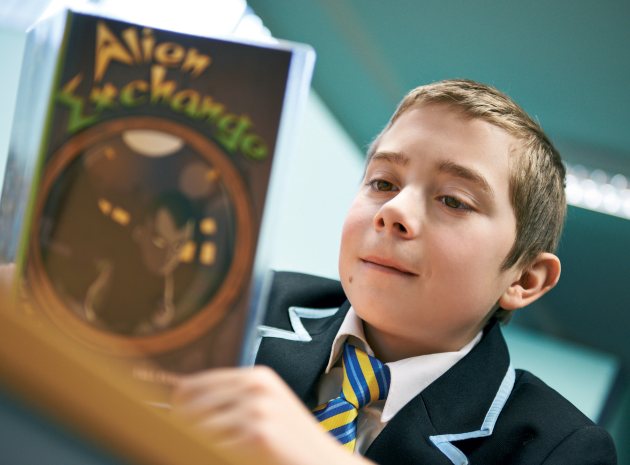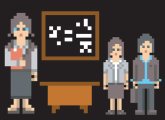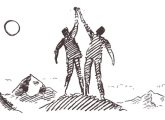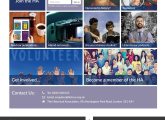Encouraging students to lose themselves in a book could help them find new ways into the curriculum – and boost achievement across the board, suggests Katie Masters…
Secondary school students who read for pleasure perform significantly better at school than other students. That was the finding of a longitudinal study published last year by the Institute of Education; the data showed that by 16 years old, the educational advantage a student gains from regular reading is four times greater than the advantage gained from having a parent with a degree. And the impact of that is felt across the curriculum, from the humanities to maths.
“It’s likely that a strong reading ability enables children to absorb and understand new information,” IoE researcher Dr Alice Sullivan has been quoted as saying. “That will affect their attainment in all subjects.” The implication is clear. If a school wants to boost results, it needs to get students reading. But how?
“For 20 minutes every day – at an agreed time during lessons – everyone stops what they’re doing, gets out a book of their choice and reads. the fact that everyone’s doing it has turned it into part of the culture of the school…”
Make reading pleasurable
As simple as it sounds, one of the ways to encourage students to read more is just to give them free choice over what they read. Research shows that choosing their own books enhances students’ motivation to keep reading. Plus, as the National Literacy Trust’s Irene Picton points out, “What a student reads is less important than the fact that they are reading. If you get them engaged by a book or a graphic novel, you’re creating the motivation for them to read again,” she adds, “and further down the line, you can work with that. If they’re gripped by the Twilight series, that interest in vampires might be a hook to get them reading Bram Stoker’s Dracula.”
The importance of free choice is a philosophy shared by Caroline Emery, Head of English at King Alfred School, an independent school in North London. “We’ve found that peer recommendation is really important”’ she says. “If teachers recommend a book, students worry that it’s going to be an ‘improving’ one. But when a friend recommends something they know it’s just going to be a genuinely great read. The English department works in close collaboration with the library –we run 50-minute library lessons once a week for our Year Sevens and encourage informal discussion about books. When we do speaking and listening activities we encourage students to talk about books they’ve loved. And our Middle and Upper School Librarian, Jenny Monaghan, also runs book clubs, where the students choose what to read. These are ways that allow word-of-mouth recommendations to run through the school. For example, one student read a book by the American author, John Green: The Fault In Our Stars. She loved it, talked about it – and most of the school now avidly read his novels.” At Shenley Academy in Birmingham the emphasis is also on promoting discussions around books.
“Something that’s had a big impact on increasing reading for pleasure has been our Drop Everything And Read (DEAR) programme,” observes Assistant Principal Jill Appleton. “For 20 minutes every day – at an agreed time during lessons – everyone stops what they’re doing, gets out a book of their choice and reads. The fact that everyone’s doing it has turned it into part of the culture of the school. It allows the students time and space to engage with reading. And because the teachers are reading too, and are deliberately reading books that are accessible to the students, that sparks conversations and interest. Teachers engaging on that personal level can kickstart things.”
Modelling good practice
Jill says that one of the things that made DEAR successful at Shenley was the fact that all the teachers bought into it, even the PE and Dance staff, who were originally exempt from taking part, but decided to join in. “It’s a clear message that everyone values reading,” she states. Matt Chalmers, the deputy head at Hazelwick School in Crawley, also advocates giving reading a high profile. At Hazelwick all the teachers have a laminated poster up in their room, saying which book they’re currently reading. Sixth-form design students are creating a series of portraits of teachers reading in different locations, which will be put up around the school. And the school has commissioned a ‘book bench’ – a bench in the shape of a book, which will be covered in book-related illustrations and put up in the grounds. “We want to create a culture of reading for pleasure and we’re approaching that in different ways,” he explains.
Another thing that’s been very positive at Hazelwick has been purchasing the Renaissance Learning Accelerated Reader software, which claims to produce an average of two years’ reading growth in one academic year, as well as promoting reading for pleasure (see renlearn.co.uk/accelerated-reader). Students complete an online test that assesses their reading abilities. The programme then creates a reading list for each learner, using a database that comprises thousands of books. The books it suggests are ones that will challenge and stretch the young person, but to a degree that motivates, rather than frustrates him or her. After reading any book the students do an online test about it, to check they’ve understood it – and the programme monitors their progress.
“The Accelerated Reader lets us see what the children are reading and how well they’re engaging with what they read,” says Matt Carter, an English teacher at Redden Court School in Essex, another secondary school that uses the software. “The software tracks all the reading, so it can bring a competitive element into play. Students compete to see how many books they can read, how many words they can read – or how many books a class can read, collectively. That competition spurs them on.”
You could also try…
Book/ film clubs
Every month Shenley Academy features a ‘Book of the Month’ and shows a screening of a film based on that book. “The first title we chose was a Percy Jackson and the Lightning Thief, by Rick Riordan,”says Jill Appleton. “The students got excited, read the book, watched the film and went on to read lots of the other Percy Jackson books.”
Staggered stories
For World Book Day Matt Carter invented an activity called ‘staggered stories’. He asked all the teachers at Redden Court to start their lessons by reading an installment of a short story – so that by the end of the day each class would have heard a full tale. “The students loved it,” says Matt. “They liked the fact they heard a little bit at a time and that everyone was involved. It got everyone talking about the books.”
Specialist publishers
Barrington Stoke (barringtonstoke.co.uk) publishes books for students with dyslexia and children who are struggling readers, commissioning top authors to write stories that have a plot and content commensurate with a reader’s actual age, along with vocabulary and font size that matches his or her reading age. Ransom(ransom.co.uk) produces many books that are specifically designed for struggling or reluctant readers, including series of books that are suitable for older teenagers and adults.
Rising Stars (risingstars-uk.com) produces a whole range of educational resources, including books and ebooks written to engage older learners, particularly boys.
Case study
Kingsmead School, Enfield, is a large school with a challenging demographic profile: of almost 1500 students, over 60% speak English as an additional language and 50% are in receipt of free school meals. Staff introduced Accelerated Reader (AR) in 2011 and quickly saw the impact it was having. “There is a huge amount of data produced with AR,” comments Jan Evans, Deputy Head. “It’s important not to be overwhelmed by it; to make it work for you.” Data is now collected in weekly reports and sent to the project team. “It’s incredibly helpful both in monitoring students’ (and staff!) performance, and also the impact of the programme.” Kingsmead took part in the National Literacy Trust’s National Literacy Survey in November 2012 and again in November 2013. “There is clear quantitative evidence of a huge improvement in engagement and in attitudes towards reading and writing,” Jan comments. The percentage of students saying that they enjoy reading very much or quite a lot increased from 47% to 72% over the year. The number reading outside class every day or almost every day doubled, from 25% to 50%. In 2012, 53% of students identified as being a reader; a year later, 87% did so. Jan has noticed this change in attitudes in daily life around the school. “Our students talk about reading; they bring books to school.” Tanaka (Y7) adds, “I never used to read much, but when we got AR it boosted my confidence. It is also a fun way of reading as sometimes you gain points and there are competitions.”
The Book Trust’s top book picks for teens
She is Not Invisible by Marcus Sedgwick (Orion)
A gripping mystery set in New York City from an acclaimed young adult author. After Iris by Natasha Farrant (Faber) A delightfully engaging novel about an eccentric family that younger teen girls will love.
Jane, the Fox and Me by Fanny Britt, illustrated by Isabelle Arsenault (Walker Books)
A gorgeously illustrated graphic novel about a young girl dealing with bullying at school.
Heroic by Phil Earle (Penguin)
A hard-hitting and emotional story about the relationship between two brothers and how it is affected by war, ideal for engaging teen boys. Trouble by Non Pratt (Walker Books) A no-holds-barred novel that gives a frank depiction of teenage sexuality; an important topic that is bound to get older teenagers talking!
About the author
Katie Masters is a journalist who would happily give it all up to live on a deserted island…as long as the island came with a deluxe library (plus a cafe and hotel)).











Encouraging students to lose themselves in a book could help them find new ways into the curriculum – and boost achievement across the board, suggests Katie Masters…